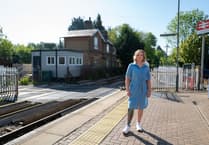A PIONEERING scheme which changed the face of out-of-hours GP cover has celebrated its 20th anniversary.
Hantsdoc was originally formed as a GP co-operative in June 1996 when GPs had round-the-clock responsibility for their patients. Hantsdoc ran as a GP co-op until the new General Medical Services contract in April 2004.
With GPs opting out of the out-of-hours care, the responsibility then passed to primary care trusts, which are now clinical commissioning groups. As a result of a Hampshire review in 2006, Hantsdoc and Frimley Primary Care Service, the out-of-hours service based at Frimley Park Hospital, merged to form North Hampshire Urgent Care but retains Hantsdoc as the local branding.
The service is commissioned for patients in North Hampshire, including those in the Alton area, by NHS North Hampshire Clinical Commissioning Group, whose clinical chairman, Dr Nicola Decker, said: “The service Hantsdoc provides is invaluable not just for patients but also for our GPs who can be confident that their patients will receive an excellent standard of care.”
The first overnight shift was taken by Dr Keith Ollerhead, who has recently returned to North Hampshire Urgent Care. He said: “We are lucky that Hantsdoc still has many local GPs working at the heart of the service. Their local knowledge and experience is invaluable.”
Dr Andrew Fernando, medical director of Hantsdoc, confirmed: “Despite the pressures on general practice that have been particularly acute over the last three years, I remain extremely proud of the service and care that has been delivered to our patients in North Hampshire by all those that work at Hantsdoc.”
Two decades later the service is based at North Hampshire Hospital in Basingstoke, providing cover for people across the hospital’s catchment area and north Hampshire, and it has handled around 381,000 calls.
The service is housed in the fracture clinic at North Hampshire Hospital, Basingstoke, providing cover from 6.30pm to 8am Monday to Friday and 24-hour cover at weekends and on bank holidays. Patients can access the service through the 111 urgent helpline.
In 2015, the service handled 42,130 cases. Of these, 41 per cent were dealt with by self-care advice over the phone, 51 per cent of patients were given appointments at the primary care centre and eight per cent of patients were visited at home.
Among the most common reasons for contacting the service were cystitis, abdominal pain, and chest infections.




